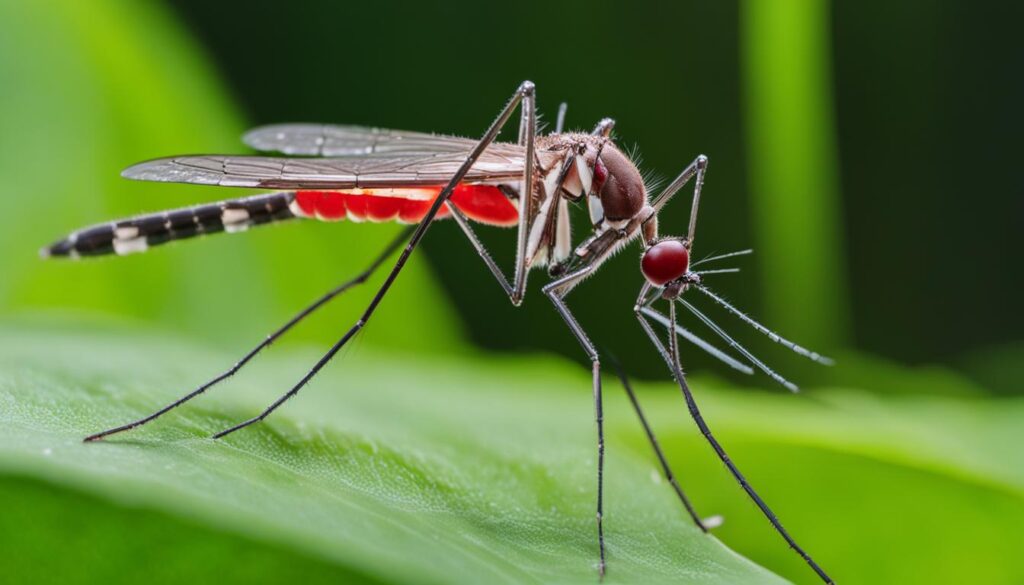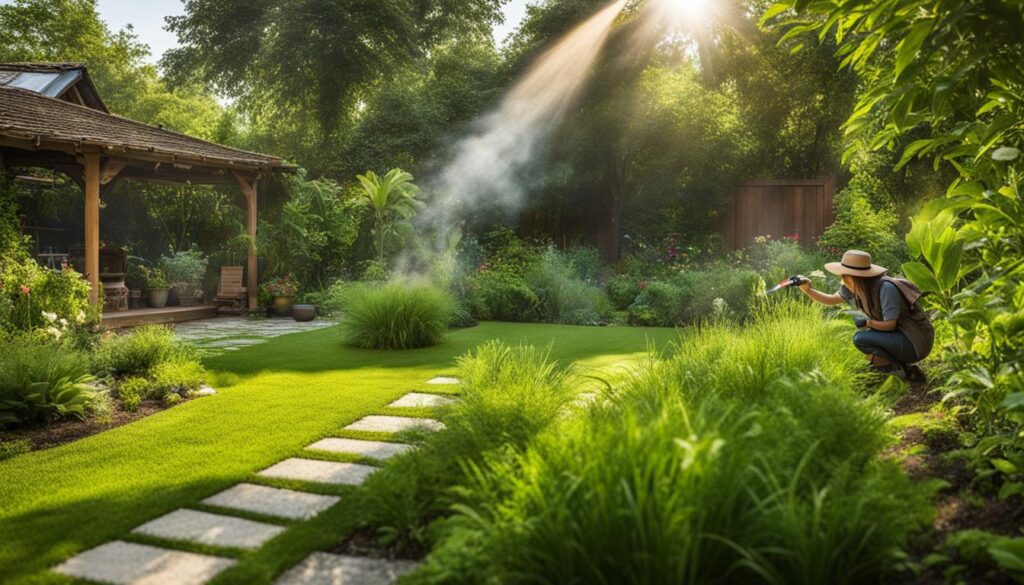To enjoy a mosquito-free outdoor space, it’s essential to know how to treat your yard for mosquitoes. These biting pests can quickly turn a relaxing afternoon into an itchy nightmare. By understanding mosquito behavior and taking specific steps to eliminate their breeding sites, you can significantly reduce their presence in your yard.
Key Takeaways:
- Understanding mosquito behavior is crucial for effective mosquito control.
- Eliminate standing water to prevent mosquito breeding.
- Implement natural mosquito control methods, such as planting mosquito-repellent plants and attracting natural predators.
- Consider professional pest control services for severe infestations.
- Regularly inspect and maintain your yard to keep mosquitoes at bay.
Understanding Mosquito Behavior
Mosquitoes are fascinating creatures with unique behaviors that contribute to their survival. Understanding their habits is essential for effective mosquito control and creating a pest-free environment in your yard.
Female mosquitoes, specifically blood-feeding mosquitoes, are responsible for the itchy bites we often associate with these insects. They require a blood meal to develop their eggs. This is why they are attracted to humans and other animals, seeking the necessary nutrients for reproduction.
Mosquitoes have a preference for laying their eggs in standing water. Puddles, birdbaths, and clogged gutters are common breeding grounds. By removing or regularly emptying these water sources, you can significantly reduce mosquito populations in your yard.
Another important aspect of mosquito behavior is their resting habitat. Mosquitoes seek cool, dark areas to rest and hide during the day. Tall grass, shrubs, and other vegetation provide ideal hiding spots for mosquitoes. By keeping your yard well-maintained and trimmed, you can minimize their resting areas and lower the risk of mosquito bites.
Understanding the behavior of mosquitoes enables you to target their breeding sites and resting areas effectively, reducing their presence and minimizing the annoyance and health risks associated with them.
Eliminate Breeding Sites
To effectively prevent mosquito breeding in your yard, it’s crucial to eliminate any sources of standing water. This is because mosquitoes lay their eggs in standing water, such as buckets, flower pots, and bird baths. By removing standing water, you can significantly reduce mosquito populations in your outdoor space.
To start, regularly inspect your yard for containers that collect and hold rainwater. Empty them regularly to prevent mosquitoes from using them as breeding grounds. It’s also important to clean and maintain your gutters to prevent water from stagnating and creating the perfect environment for mosquitoes to breed.
If you notice any leaks or broken sprinkler heads, make sure to fix them promptly to avoid the formation of puddles. Additionally, don’t forget to refresh outdoor water features like bird baths and fountains regularly and maintain swimming pools with proper chlorination to discourage mosquitoes from laying their eggs.
Another effective measure is to cover containers such as rain barrels and outdoor trash cans. This helps to prevent mosquitoes from accessing these areas and laying their eggs. Finally, filling tree holes and voids in your yard can also eliminate potential breeding sites.
By taking these proactive steps to remove standing water and maintain your gutters and outdoor water features, you can significantly reduce mosquito breeding sites in your yard and create a more enjoyable outdoor environment for yourself, your family, and your guests.
Note: Removing standing water and maintaining gutters is an effective way to prevent mosquito breeding in your yard.
Natural Mosquito Control Methods
Natural mosquito control methods are an effective and environmentally-friendly way to reduce mosquito populations in your yard. By implementing these methods, you can create a more comfortable and pest-free outdoor space. Here are some natural mosquito control methods to consider:
Plant Mosquito-Repellent Plants
One of the most effective ways to ward off mosquitoes naturally is by planting mosquito-repellent plants. These plants emit natural scents that repel mosquitoes, making them less likely to hang around your yard. Some popular mosquito-repellent plants include American beautyberry, basil, citronella, and marigolds. These plants not only add beauty to your landscape but also serve as natural deterrents against mosquitoes.
Attract Natural Predators
Another natural way to control mosquito populations is by attracting their natural predators to your yard. Birds, bats, and dragonflies are known to feed on mosquitoes and their larvae. By creating an environment that attracts these beneficial creatures, you can create a balanced ecosystem that naturally helps reduce mosquito populations. Providing birdhouses, bat boxes, and water features like ponds can attract these natural predators and help keep mosquito populations in check.
Minimize Artificial Light
Mosquitoes are attracted to light sources, so minimizing artificial light in your outdoor space can help reduce their presence. Use dimmer outdoor lighting or opt for yellow or amber-colored bulbs, as they are less attractive to mosquitoes. This simple measure can help create a less appealing environment for mosquitoes and make your outdoor space less inviting to these pesky insects.
Use Chemical Solutions Sparingly
While natural methods are preferred, there may be situations where chemical solutions are necessary to control mosquito populations. If you choose to use pesticides, be sure to use them sparingly and target mosquito-prone areas. It’s important to follow the instructions provided by the manufacturer and avoid excessive use, as this can harm beneficial insects and disrupt the natural balance of your yard.
By implementing these natural mosquito control methods, you can significantly reduce mosquito populations in your yard and enjoy a more peaceful and enjoyable outdoor space. Remember to always prioritize environmentally-friendly solutions and use chemical-based options as a last resort. With a little effort and planning, you can create a mosquito-free environment that allows you to fully enjoy your time outdoors.
Conclusion
By following these mosquito control tips and implementing effective mosquito prevention strategies, you can create a pest-free yard and enjoy your outdoor space without the annoyance and health risks associated with mosquitoes.
To achieve a mosquito-free environment, it is crucial to eliminate breeding sites in your yard. Regularly inspect your yard for standing water and remove any containers or objects that can collect water. Maintaining gutters and drains can also prevent the accumulation of stagnant water. By taking these simple steps, you can greatly reduce mosquito populations and minimize their impact on your outdoor activities.
In addition to removing breeding sites, incorporating natural mosquito control methods can further enhance your efforts. Planting mosquito-repellent plants like citronella, basil, and marigolds can act as a natural deterrent. Attracting natural predators such as birds and dragonflies can help keep mosquitoes at bay. By creating a balanced ecosystem, you can effectively control mosquito populations without relying on chemical solutions.
If you are facing a severe mosquito infestation despite your best efforts, consider seeking professional pest control services. They have the expertise and resources to address the issue effectively and provide long-term control. Remember, a pest-free yard not only enhances your outdoor experience but also helps protect your family’s health from mosquito-borne illnesses.
– How can I effectively treat my yard for both mosquitoes and ticks to ensure a pest-free outdoor space?
To effectively treat your yard for mosquitoes and ticks and ensure a pest-free outdoor space, consider using a tick repellent for yard. Look for a product that is specifically designed to repel ticks and apply it according to the manufacturer’s instructions to keep both mosquitoes and ticks at bay.
FAQ
How can I effectively treat my yard for mosquitoes?
To effectively treat your yard for mosquitoes, it’s important to understand their behavior and take specific steps to eliminate their breeding sites. Removing standing water, maintaining gutters and drains, refreshing water sources regularly, and using natural mosquito control methods can help reduce mosquito populations in your yard. In some cases, professional pest control services may be necessary.
Why do mosquitoes lay their eggs in standing water?
Female mosquitoes lay their eggs in standing water because they require it for their larvae to develop. Puddles, birdbaths, and clogged gutters are common breeding sites for mosquitoes.
How can I eliminate mosquito breeding sites in my yard?
To eliminate mosquito breeding sites, you should remove any standing water from your yard. Regularly empty containers that collect rainwater, clean and maintain gutters, fix leaks and broken sprinkler heads, refresh outdoor water features, and cover containers like rain barrels and outdoor trash cans. Filling tree holes and voids can also eliminate potential breeding sites.
What are some natural mosquito control methods I can use?
There are several natural mosquito control methods you can use to reduce mosquito populations in your yard. Planting mosquito-repellent plants like American beautyberry, basil, citronella, and marigolds can deter mosquitoes. Attracting natural predators like birds, bats, and dragonflies can help create a balanced ecosystem and reduce mosquito populations. Minimizing artificial light can also be helpful, as mosquitoes are attracted to light.
When should I consider using chemical solutions for mosquito control?
Chemical solutions, such as pesticides, should be used as a last resort and sparingly. They should only be applied to mosquito-prone areas and following the instructions on the product label to avoid harming beneficial insects.











